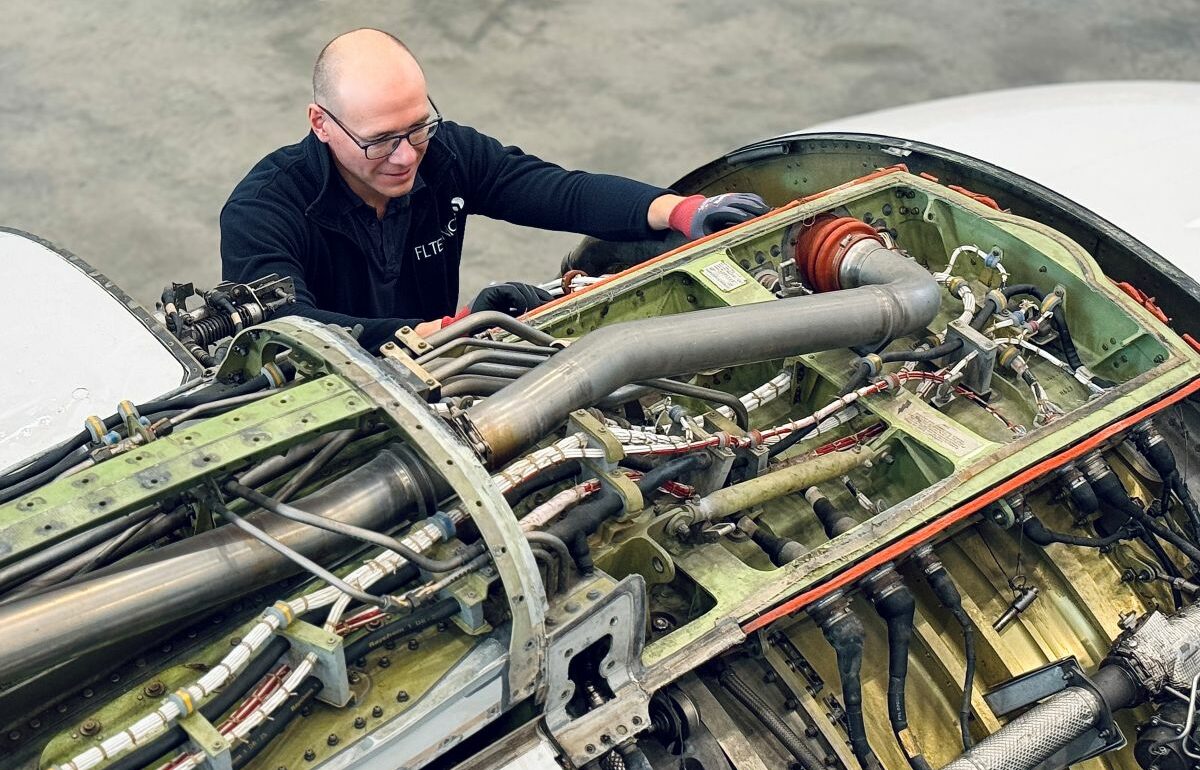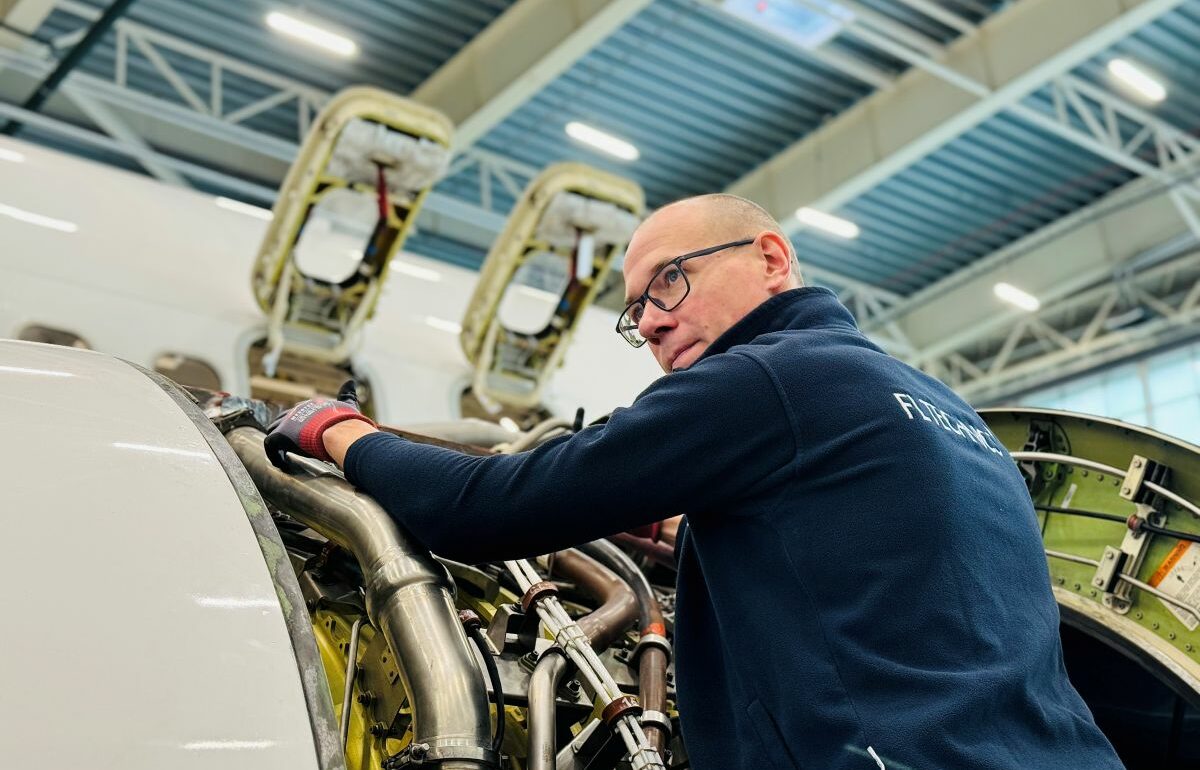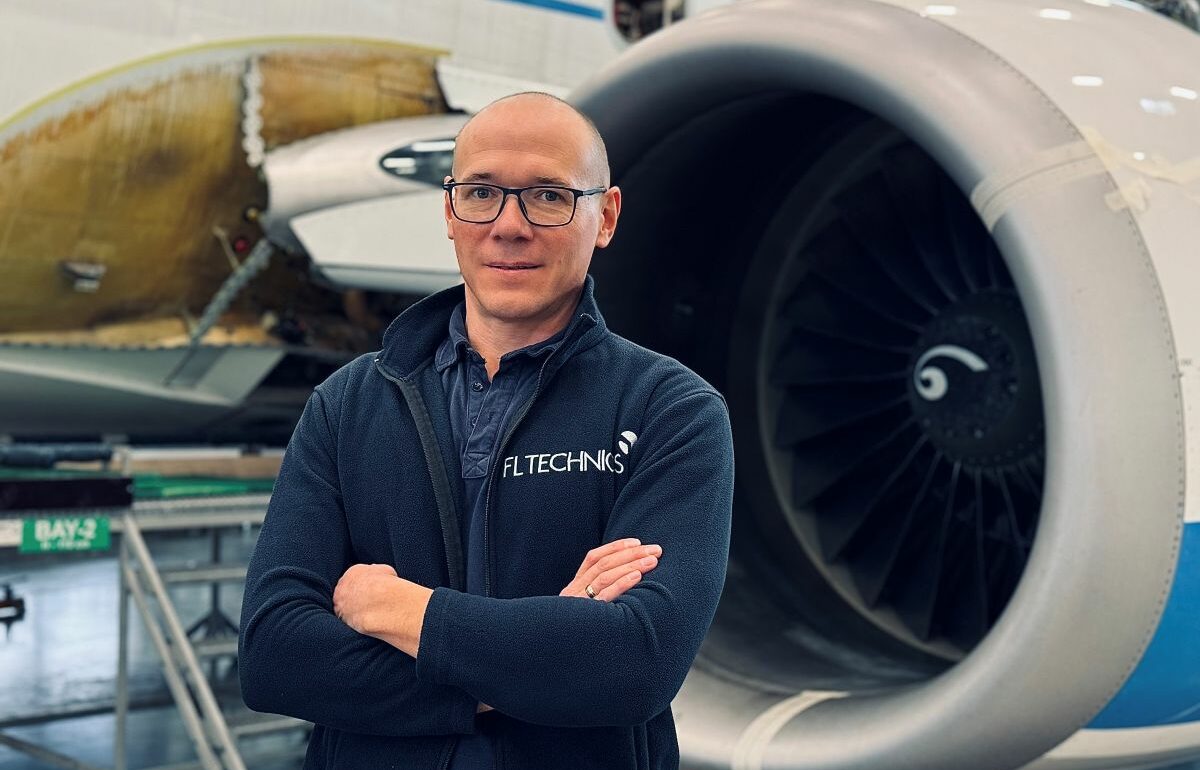The idea of a successful career path is pretty straightforward to many: finish school, attend university or a similar educational institution, earn your diploma, find your first job, and gradually climb the career ladder. This is rarely the case in reality. Real-life stories usually involve many more twists, turns, and leaps of faith. Mindaugas Lisauskas, an aviation technician at FL Technics, is a perfect example. He seemed to be doing everything according to plan, but his old love for aviation had other ideas.
Yours is not a traditional success story. Is it true that you had virtually nothing to do with aviation for a very long time?
Yes, it’s true. Yet, I have felt drawn to aviation as far back as I can remember. Any movie about planes on TV would keep me glued to the screen when I was a child. When my brother and I were little kids, our dad had a hobby of building plastic plane models. Sure, he would sometimes let us glue parts together, but he probably regretted it afterwards.
I spent my free time fixing and riding bikes with my friends, and as I got older, motorbikes and eventually cars took their place. It was my thing. Perhaps that’s what made various technical and engineering tasks later – easy.
However, aviation was always in a class of its own. I attempted to apply to aviation engineering studies after school, but I didn’t receive state tuition coverage. My parents were simply unable to pay for my studies, so I took a completely different path, leaving aviation behind in pursuit of my dreams. I graduated with a degree in economics and continued to work in business for many years, fifteen of those years spent in pharmacy. For the last thirteen years before joining FL Technics, I had been the regional manager of one of the largest pharmacy chains.
When and how did you finally realise that you should follow your dream?
I was convinced that aviation could only be accessed through formal studies. Of course, no one in my circle was involved in this field, but somehow, I was sure. Of course, no one in my environment was involved in this activity, but, somehow, I was sure. Only later did I learn that aviation has its own strict rules, training organizations, and assessment methods. Whether you have a degree in aviation engineering or economics, you still need to follow the same procedures.
I learned all this, I think, while I had some time on my hands and nothing else to do. I simply sat down and started to Google. I read that aircraft technical maintenance activities required a license. So I started searching for information on the rules that apply to acquiring such a license and the requirements you have to meet. First of all, I was very surprised and delighted to find out that you didn’t need a degree in aviation at all. The news hooked me, and I started searching for ways to follow my dream. I started studying for my first exam in mathematics while I was still working in pharmacy, but I was already fully convinced that I wanted to give myself a chance in aviation. I was 38 years old back then. I don’t know if that’s a lot or not, I simply realized that the time had come.
Making such a big change, especially considering the successful career you had built in a completely different field, must have been quite challenging. Where did you find the courage?
While working in pharmacy, I was surrounded by excellent management, colleagues, and employees. Beyond financial performance, the organization placed significant importance on the psychological well-being of the staff. I believe that’s why they invested so much in us, sending us to various training programs. This probably helped me develop the right attitude toward life and understand that I am the master of my own fate. The birth of my daughter Gertrūda only reinforced my resolve and belief in myself. When you realize that, it gives you courage. After all, courage isn’t about taking a blind leap—it’s about taking action and assuming responsibility for the consequences.
What were your first steps in aviation? What helped to settle in and find your place in a field that was completely new?
I started studying for my first exam in the autumn and began working with FL Technics in February. The story of how I got there is quite interesting. You could say it was thanks to one of the pharmacists that I worked with for many years. I remember her call on my first day off work. I answered the phone and she said that she’d heard that I was interested in aviation. It turned out that her husband worked at FL Technics. And so it began. There was a phone call and we met for a cup of coffee. Convinced by my enthusiasm, he introduced me to one of the hangar managers. And so I opened the door that I believed to be locked for so many years.
Pharmacy and aviation don’t seem to have much in common, so I had to learn everything from the beginning. Where did you start?
It all began with lots of introductory trainings. Aircraft maintenance activities are licensed, so my initial goal was to obtain a license. It took me approximately three years. Then there was aircraft type training, which involves studying all aircraft systems, their interaction, structure, and elements, and some disciplines are taught through the piloting perspective.
My family and friends occasionally ask me when my studies will finally be finished. After all, we usually see studies as a finite process. However, in aviation, you continue learning as long as you wish to improve your qualifications and add new aircraft types to your licenses. It means that I will just keep learning. I need it, I love it, and I want it.
A career in aviation is primarily about competence. Personal sympathies don’t matter much. It all depends on your qualifications. Your bright blue eyes, hair colour, age, people you know, or whatever else won’t land you a position. However, all doors can open if you’re up for learning. Good specialists are always in demand. Continuous improvement is one of the main reasons I really like it here.
Learning must be much easier when the internal culture of your workplace is so encouraging?
We always support the desire to learn, and employees have all the opportunities. I do my best to be the one to come forward and state what I want, and I have received only positive feedback so far. All it takes from the employee here is initiative and the willingness to say that you want to acquire a license, learn to work with certain aircraft types, etc. You’ll definitely receive all the necessary conditions and opportunities.
You mentioned that aviation had been a distant dream for many years because you thought the only way to enter the field was through university. Surely, you’re not the only one. And surely you’re not the only one. What are the most common beliefs people have about aviation?
FL Technics organizes many tours. Whenever there’s one during my shift, I’m often asked to be the guide. Whenever there’s one on my shift, I am often asked to be the guide. I really love doing it. It doesn’t matter if my audience is a group of kindergarteners or adults from completely different fields. I find it very meaningful, and when talking about aviation to them, I always highlight the fact that this world is available to everyone.
You don’t need to have three arms, six fingers, or a degree in aircraft engineering. Yes, it will cost you lots of learning and effort, but the opportunities are there for you. If randomly asked about aviation, the majority of people would say that it’s about pilots and flight attendants.
What would you say to someone like you? Someone who’s been dreaming about aviation, but doesn’t know, doesn’t dare, and has doubts?
I think that courage for change comes with maturity. Taking certain steps and making decisions requires growth. If the timing is off and you attempt to act older or younger than you are, it won’t work. You have to find the right time.
During one of the career fairs, we were approached by a tenth grade student. You could see the passion for aviation burning in his eyes. I invited him to visit us, take a tour of the hangar and the aircraft, and learn about what we do. This summer, at just eighteen years old, he completed his internship with us and is likely convinced of the career path he will take in the future. I am truly delighted and proud that FL Technics could offer this opportunity. I am also convinced that this was only the ‘first step,’ and there will be many more in the future. I always ask my acquaintances to give my contact details to anyone they know who is curious about aviation, how things work, and ways to get there. I’ll do my best to explain the twists and turns of this path so that they don’t have to wander aimlessly, as I once did.


